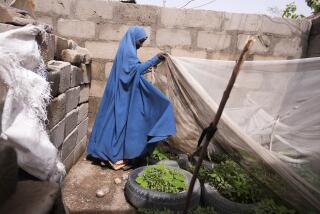Aid Cuts, Poor Policies Add to World Poverty, U.N. Says
- Share via
UNITED NATIONS — About 1.5 billion people in developing nations earn less than the equivalent of $1 a day, partly because of stingier aid-giving by rich countries and feeble efforts by their own governments to fight poverty, according to a U.N. report released Friday.
In South Asia, half the children younger than 5 are malnourished, and almost two-thirds of all South Asian women are illiterate. In sub-Saharan Africa, a third of the population is unlikely to live past age 40, according to “Overcoming Human Poverty,” a report issued by the U.N. Development Program.
Despite glimmers of progress--more poor countries are forming plans to combat extreme poverty--the global financial crisis has heightened the need for more effective measures to help the world’s poor, the study said.
Aid from donor countries is at an all-time low, with contributions at just a fifth of 1% of the donors’ combined gross domestic products.
At the same time, many developing countries are burdened by crippling debts.
Ghana’s economy grew by 5% a year during the 1980s, but a third of its people are still classified as poor. The study attributed the lack of improvement in part to Ghana’s need to repay its foreign debt.
Tunisia was relatively successful at fighting poverty despite a modest economic growth of 2.2% a year from 1975 to 1995. The number of poor Tunisians dropped sharply over that period, from 22% to 6%.
Vietnam has avoided widening inequalities between rich and poor even though its economy grew by more than 7% from 1990 to 1995.
Inequality between men and women also is a concern.
On the positive side, small-scale lending programs for female entrepreneurs have helped some poor women earn higher incomes.
More to Read
Sign up for Essential California
The most important California stories and recommendations in your inbox every morning.
You may occasionally receive promotional content from the Los Angeles Times.












